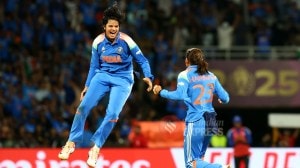Contradictory versions of ATS and NIA, witnesses’ testimonies: How SC and Bombay HC flagged flaws in probe against Pragya Thakur, Col Purohit
Former BJP MP Pragya Singh Thakur and Lt Col Prasad Purohit were acquitted in the 2008 Malegaon blasts case.
 Former BJP MP Pragya Singh Thakur and Lt Col Prasad Purohit. (File)
Former BJP MP Pragya Singh Thakur and Lt Col Prasad Purohit. (File)While a special court in Mumbai Thursday acquitted former BJP MP Pragya Singh Thakur and Lt Col Prasad Purohit in the 2008 Malegaon blasts case, the Bombay High Court and the Supreme Court, while granting them bail in 2017, pointed out the contradictions in witness testimonies and probe reports filed by Maharashtra ATS and the NIA.
Six people were killed and over 100 injured on September 29, 2008, when an explosive device placed on a motorbike went off near a mosque in Malegaon in Maharashtra’s Nashik district.
Special judge A K Lahoti, while acquitting all seven accused in the case Thursday, noted that the prosecution proved the blast but failed to establish that a bomb was fitted in the motorcycle.
Bombay HC on Pragya Singh Thakur
In April 2017, the Bombay High Court granted bail to Thakur, and observed that in respect of witnesses in the case, “apart from retraction and allegation of torture, their statements give two contradictory versions.”
A bench led by Justice (now retired) Ranjit More observed that though there was some material on record that Thakur was present at the Bhopal meeting, the material showed that apart from her, several other persons were also present for the same.
“In our view, the same cannot be considered as circumstance against the Thakur alone, excluding the other participants, especially, now in the absence of any objectionable and incriminating material attributed to her,” the bench noted.
The bench said if ATS and NIA reports were considered conjointly, “There were no reasonable grounds for believing that accusations made against her are prima facie true.” Therefore, it said that she can avail the benefit of bail “even if the offences alleged against her by ATS are grave and serious ones.”
SC on Lt Col Prasad Purohit
Granting bail to Purohit after nearly 8 years and 8 months of imprisonment, the Supreme Court in August 2017 flagged “material contradictions” in the charge sheet filed by the Anti-Terrorism Squad (ATS) Mumbai and the supplementary chargesheet of the National Investigation Agency, and said that the same should be tested at the time of trial.
The top court also observed that Purohit, who was an intelligence officer of the Indian Army, had refuted the claim of conspiracy on the grounds of Intelligence inputs which he informed his superior officers.
In January 2021, Purohit informed the Bombay HC that he was collecting intelligence for the Army as per his duty by attending conspiracy meetings held before the 2008 blast. Purohit argued that he was deputed to collect intelligence about a right-wing organisation called Abhinav Bharat, as a public servant, and he provided inputs to higher authorities.
In July that year, Purohit claimed before the high court that he was an ‘unsung hero’ of the Indian Army, and had suffered for nearly nine years, which he spent in jail before he was released on bail.
In January 2023, the high court dismissed his plea seeking discharge from the 2008 Malegaon blast case. The HC questioned that if Purohit’s contention was to be accepted, then the question remained to be answered “why he did not avert the bomb blast in the civilian locality of Malegaon, which caused the loss of life of six innocent persons and severe to grievous injuries to about 100 persons.”
The Supreme Court, in March 2023, dismissed Purohit’s appeal against the Bombay HC order.
Monitoring the trial in the case, the HC in 2022 said that while it could not direct the special court on how the trial should be conducted, it expressed concerns about “the waste of judicial time” over NIA calling merely one witness every hearing.
The high court directed the special court designated under the NIA Act to submit a fortnightly report on progress in the trial, and suggested that more than one witness be examined for each hearing, and bailable warrants can be issued against those who do not appear.







